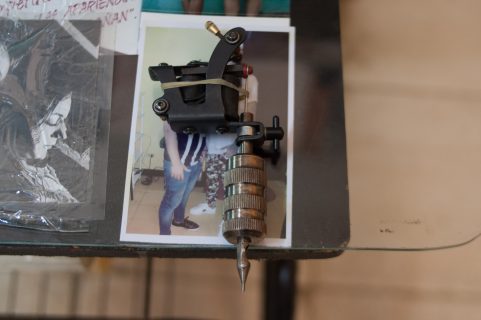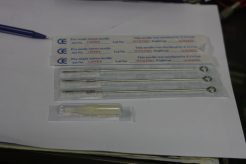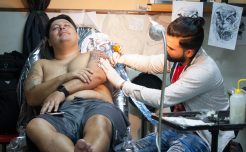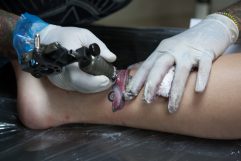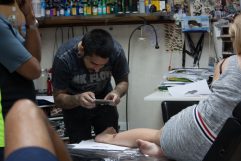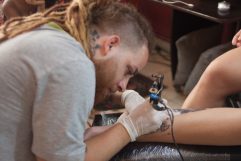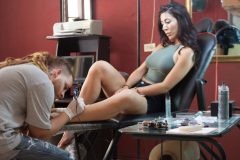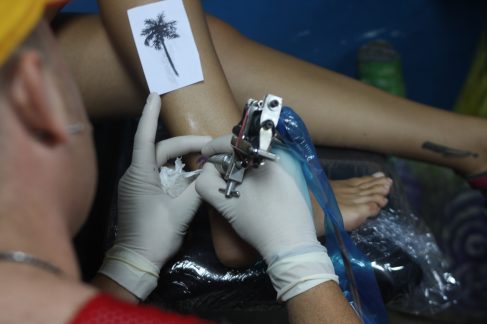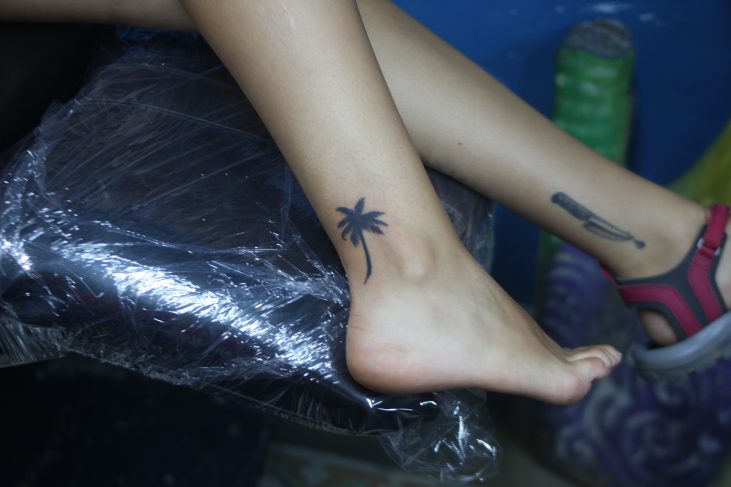Tattooing in Cuba
By Allison Weseman
In the United States tattoos are seen as art expression. They are representation of a person’s interests and what they are passionate about.
When it comes to tattoos, people don’t think about the stigma, all they are concerned about is the level of pain and if the finished product comes out to how they imagined it.
Unlike in the United States, tattoo artists in Cuba largely operate underground. The government doesn’t believe that what they are doing should be considered art, as it can’t be hung in a museum or on a billboard. They view it as selfish because the person chose to get something that is personal to them and doesn’t reflect the views of the state. The problem though with working underground is that tattoo artists are solely responsible for acquiring supplies and equipment that is needed.
This has lead artists to go in two different directions, one where they cut safety corners such as reusing the same needle and not changing it after every use or practicing safety standards that are seen in the United States for instance using a clean needle and disinfecting the room. It is difficult to find tattoo artists who were the type to openly cut corners to gain a larger profit for their work.
These standards, which are not always used in Cuba, I have come accustomed to because like the majority I have only gone to places in the states that are regulated by a safety board. In Cuba though, I found various tattoo shops where the artists are more concerned about safety instead of saving money, which is how it should be. It shouldn’t be the other way around as people face more of a risk of catching hepatitis A and other diseases because the needle that is being used is not clean.
Alba of Barcelona, Spain shows off her finished tattoo which is a Cuban palm tree.
It’s 1pm in Havana, Cuba when Bailey and Yunior arrive to unlock the door to their tattoo shop, ready to get to work. There is a lot to get done before Alba and her friend from Barcelona, Spain come in at 6pm. The room needs to be sterilized, stencils need to be drawn and confirmed by the girls, and above all else making sure that Junior’s one year old daughter is occupied so she doesn’t disrupt her dad.
Getting a tattoo abroad is not a new concept as most tourists want to remember their time abroad, yet in a country that was only opened up to Americans two years ago it might as well be an outlandish idea.
Walking into a tattoo shop in Cuba is kinda the same as in the United States because the artists are former painters and drawers who fell in love with tattooing. “I have been doing tattoos for thirteen years. I started painting and doing low quality tattoos. The turning point for me was when everyone started to notice my work and began asking for me,” says Marco Coca. As a result of improved diplomatic relations between the United States and Cuba, tourists have tracked down reputable tattoo artists. “I have always liked drawing and when I had the chance to tattoo, I jumped at it,” says Carlos Fuerro. The difference between the two countries when it comes to body art is that the United States accepts tattoos as a form of expression. The Cuban government on the other hand doesn’t see how they can be classified as art. “For the government, art is painting, music, dancing, and sculpting, tattoos are a tale of the person and what they have been through,” says Bailey.
Unlike in the United States, tattoo artists in Cuba are forced to import equipment such as needles, ink, and machines from America or other countries.Tattooists will buy everything they need off Ebay or they will have it delivered by people who travel from Florida to Cuba. If artists find that they need additional equipment in order to perform their jobs safely, they will buy it in country for twice the price of what they would have paid if they bought it in the United States.
While tattooing is not legal or illegal in Cuba, many tattooists have found that they must operate in a grey area in order to fly under the government’s radar. This means dedicating rooms in their home or renting gallery spaces as makeshift studios. “We don’t have to pay taxes as there isn’t an institution for tattoo studios to pay to. Tattoos are not seen as expression, they see it like a business. Musicians, painters, and dance groups belong to an institution, they charge them fifty percent of their income,” says Bailey.
Working in this type of environment where the government is divided when it comes to tattoos, artists have found they have to go to great lengths to acquire equipment that they would have unlimited access to if they worked in a tattoo studio in the United States. This becomes a problem as artists have found that they can’t acquire enough supplies to keep up with the influx of tourists who want tattoos. . “There is a fear of being shut down but since we are in a legal limbo, our only defense is our work,” explained Yunior Luna.
The risk of being shut down is still prevalent as the government did a sweep on tattoo shops back in 2015. Officials seized equipment such as needles,ink, and tattooing machines. Many artists were confused because they weren’t given a clear explanation as to why there shops were being shut down. This lead tattooists who weren’t raided to close their tattoo shops out of fear. “If the government comes in one day, its like they are taking away my son, my life,” says Marco Coca
Although the government is divided between supporters of tattoo artists and non-supporters, officials have allowed tattooists to set up shop in old Havana because its a popular spot with tourists and locals alike. In an effort to keep up with changing attitudes around tattoos, officials have opened up the possibility of tattoo parlors being licensed with the acceptance of La Marca tattoo parlor, which is located in Central Havana. Artists at La Marca and other local tattoo shops have found that tourists want to remember their time on the island with iconic cuban elements such as revolutionary figures.
Since the embargo was lifted by former president Barack Obama in 2014, tattoo artists have began to look at expanding their portfolios by working at tattoo shops in the United States. In order to be a guest tattoo artist, Cuban tattooists have relied on social media to showcase their work. “I’m hoping for an invitation from a studio in Florida to work there for a few days,” says Bailey.
In the United States tattoo artists must be certified and complete a professional portfolio before they are given an invitation by a tattoo studio. From that point they are required to follow strict safety standards that are set by the state in which they work in. Clients who wish to get tatted must be eighteen years old and carry identification on them at all times during the tattoo process as the artist will check every time even if both parties know each other. Along with being of legal age, clients most of the time will have to put down a deposit to save the appointment months in advance. The money that is taken in the beginning of the tattoo process is then applied to the total cost of the tattoo.
Compared to America, laws in Cuba regarding tattoos are more relaxed as there is no official government or health agency dedicated to enforcing tattoo regulations. This has lead tattoo artists to get certification from the Florida Tattoo Education course. Tattooists who wish to tattoo as guest artists in Florida are required to be licensed. Through this course aspiring artists are able to complete it online and depending on which department they go through to get certified, it can cost between forty five to a hundred dollars. “The best I can do is get certified,” says Carlos Fuerro.
While the legal age to get a tattoo is eighteen, minors who have a parental guardian with them who will accept responsibility are able to get a tattoo. The problem though is that it doesn’t have to be a blood relative but a friend who is of legal age that can sign release forms that frees tattoo artists from any legal responsibility. Clients as well don’t need to have identification on them at all times as the artists trust that they are eighteen or older.
Tattoo artists have realized that not a lot of people in Cuba can afford to pay high deposits that clients have to pay in the states. To keep costs low, tattooists won’t charge a deposit or if they do it is usually around ten dollars. The money that is used to keep the appointment is then applied to the total cost of the tattoo. Along with having reasonable prices for tattoos, there is a general sense among tattooists in Cuba that not all tattoos are done equally and require touch ups or cover ups as they fade over time. Since clients are not at fault for any bad tattoo work, tattoo artists won’t charge them as it was the original artist’s fault.
Although there is still a stigma surrounding tattoos in the United States, they have become accepted among people in society as they have become commonplace. The opposite is true in Cuba where tattoos are still seen as being associated with criminals. “Certain tattoos are still identifiable with gangs such as shamrocks, that can be traced to the Aryan Brotherhood,” says Bailey. “People don’t see this as art but in some way that’s good. The worker has no way to improve themselves. Most artists have talent but can’t express it because we don’t have a license to work,” continued Bailey.
Tattoos have come a long way since the heydays of the 1950s when they were associated with prostitutes and sailors. It has evolved into a serious industry that the government will one day recognize. Until that day comes, artists will have to relay on social media and word of mouth to generate buzz about their artwork. “I hope one day tattoo artists will be able to operate without a fear of the government coming in,” says Yaniel Cueto
